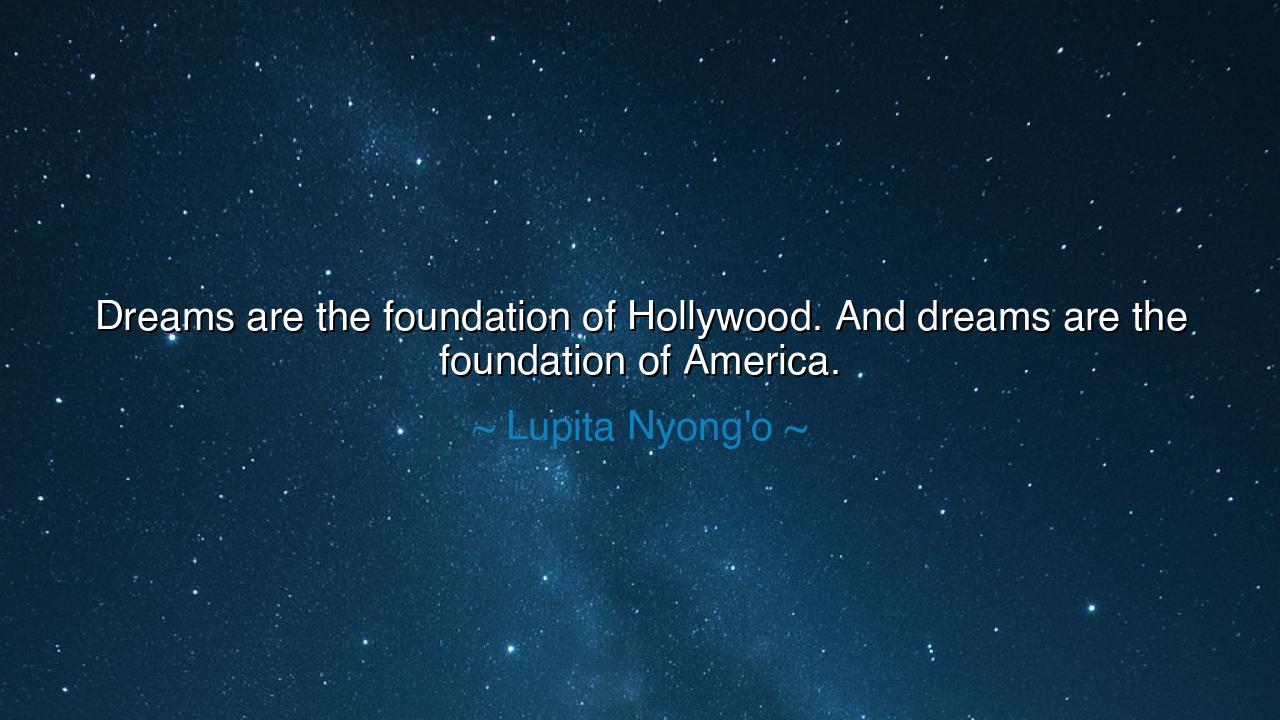
Dreams are the foundation of Hollywood. And dreams are the






“Dreams are the foundation of Hollywood. And dreams are the foundation of America.” – Lupita Nyong’o
In these luminous words, Lupita Nyong’o, the celebrated actress and storyteller, gives voice to a truth that transcends cinema and borders — that dreams are the lifeblood of creation, the sacred fire upon which nations and imaginations are built. Her statement is both poetic and prophetic: that what gives vitality to Hollywood, the world’s temple of storytelling, is the same invisible power that forged America, the land of possibility. Behind both lies the same force — the dreamer’s courage to believe in what is not yet real. Nyong’o, born in one nation and celebrated in another, speaks as one who has walked between worlds and knows this truth deeply: that dreams are not illusions, but blueprints of destiny.
The origin of this quote arises from her reflections on the transformative power of storytelling — especially within the realms of film and aspiration. For Hollywood, at its heart, is not a mere industry, but a dream factory, a place where imagination shapes the world’s perception of what could be. And America, as an idea, was itself a story before it was a state — a vision of liberty, opportunity, and reinvention. Both were born from the human will to hope. In this way, Nyong’o reminds us that to dream is to participate in the eternal act of creation; every film that moves the heart, every life that defies circumstance, is part of the same great narrative: the dream that becomes reality.
The ancients, too, would have understood her words. They spoke of the power of vision, of the sacred duty of the dreamer to bring unseen things into the world of form. The prophets of old dreamed of justice; the artists of the Renaissance dreamed of beauty; the founders of nations dreamed of freedom. Every civilization begins first in the mind, in that fragile but indomitable space where imagination meets faith. Nyong’o’s insight unites this ancient wisdom with the modern spirit — for Hollywood and America, though born in different times, both spring from this same eternal source: the belief that tomorrow can be greater than today, and that human beings can create their own destiny.
Consider the story of Walt Disney, who, before he built his empire of imagination, was a young artist who had known failure, hunger, and ridicule. When his first studio collapsed, he could have surrendered to despair. But instead, he dreamt again — of a mouse who could speak, of worlds where good triumphed over evil, of laughter that transcended hardship. From that dream came an empire of wonder, and generations of children learned that dreams, when pursued with courage, shape reality. So too did the American nation rise from the dreams of men and women who crossed oceans, faced persecution, and built anew — believing that freedom was not a gift of the past, but a promise of the future.
Nyong’o’s quote also carries within it a deeper, more personal truth. As a woman of African heritage who triumphed in the heart of Hollywood, she embodies the very essence of what she speaks: the power of the individual dreamer to overcome boundaries of culture, color, and expectation. Her journey from Nairobi to the Academy Awards is not merely the story of talent; it is the fulfillment of a dream that once seemed improbable. Her triumph is proof that dreams are the bridges between worlds, uniting the distant and the different, the imagined and the real. Her words remind every listener that the dreamer’s path may be hard, but it is sacred — for through it, the human spirit grows immortal.
Yet her statement also serves as a quiet challenge. If dreams are the foundation of both Hollywood and America, then both must remember the purity of that foundation. For when dreams become corrupted by greed or power, when imagination serves only profit and ambition, the spirit of creation fades. The true strength of any dream — whether that of a nation or an artist — lies not in its grandeur, but in its goodness. A dream that uplifts others, that gives hope, that tells the truth — this is the kind that endures. Nyong’o calls upon us, therefore, to dream responsibly: to use imagination not for escape, but for empowerment; not for vanity, but for vision.
So let this teaching be passed down: Dream, and do not fear to dream greatly. For in every dream lies the seed of transformation. Let the builders dream of better cities; let the poets dream of beauty; let the oppressed dream of freedom. And let us, like Lupita Nyong’o, honor the dreamers of all ages — those who built the screen and the skyline, who turned hope into heritage. For dreams are not fragile illusions; they are the architecture of the future. To dream, then, is to believe in humanity’s divine calling — to imagine what does not yet exist, and through courage, love, and labor, bring it forth into the world.






AAdministratorAdministrator
Welcome, honored guests. Please leave a comment, we will respond soon